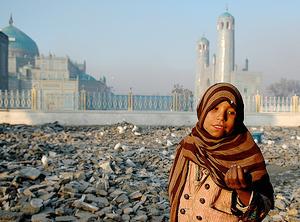 阿富汗第二大城馬札里謝里夫(Mazar-e-Sharif)的居民,目前正忍受著早期因軍閥擴張土地而造成的環境汙染。
阿富汗第二大城馬札里謝里夫(Mazar-e-Sharif)的居民,目前正忍受著早期因軍閥擴張土地而造成的環境汙染。
阿瑪莎彌(Amad Samim),今年15歲,當他跟朋友在街坊巷道踢了一場活力充沛的足球賽之後,他從頭到腳都佈滿了灰塵。他家即位於馬札里謝里夫的卡特沙西盧丁法拉比(Kart-e-Zahiruddin Farabi)。
他深深吸了一口氣說,「當我在踢足球的時候,我的鄰居們都對我大吼大叫,說我會打破他們的窗戶;而我的家人也對我很生氣,他們怕我會被車撞到。」
他的一個朋友幾天前被車撞斷了腿,然而阿瑪說,「但是有哪裡可以讓我們踢足球?沒有操場,也沒有公園,我們還能做什麼呢?」
數十年來的土地鬥爭讓馬札里謝里夫以及巴爾赫省(Balkh province)其他大部分的區域,僅剩下極少或根本沒有開放空間或綠地,而當政府試著要處理土地回收這個幾乎是不可能的任務時,當地居民就必須忍受著生活在沒有樹木或其他植物的汙染環境中所帶來的不良影響。
馬札里謝里夫失去開放空間已經好幾十年了,自從1990年代開始了所謂的「軍閥時代」,在那些時期,擁有權力和軍隊的人就可以像統治個人領地一樣統治他的轄區,還可以佔領土地、恐嚇人民、在某些情況下甚至可以發行自己的貨幣。
這些軍閥也會採取私人贊助的方式,讓土地在技術上歸屬於中央政府,即使如此,土地問題仍然是阿國中央政府目前所面對最棘手的問題,而且在很大的比例上造成該國司法改革進度緩慢。
巴爾赫省省長阿塔穆罕默德諾爾(Atta Mohammad Noor)表示,「回收政府土地對我們而言仍然是一項大挑戰,土地惡霸還是在這些公有土地上非法建造建築物,然而我們看到這種情況但卻無能為力。」
阿塔補充說道,在1990年代,強人杜斯塔姆(Abdul Rashid Dostum)統治大部分的北部地區,上千公頃的土地被強佔,並且賣給了軍閥。而今,經過幾十年之後,幾乎是不可能回收這些土地,或是找到真正的地主。
阿塔說,「杜斯塔姆將軍下令分發30,000 jeribs(土地單位,約15,000公頃)的政府土地給他的副將,而這位副將隨後也收到了正式文件表示其擁有該土地。」
Residents of Mazar-e-Sharif, Afghanistan's second -largest city, are suffering from a polluted environment caused by urban expansion on land seized by warlords.
Amad Samim, 15, was covered in dust from head to toe after his energetic football game with friends on the street of his neighborhood, Kart-e-Zahiruddin Farabi, in Mazar-e-Sharif.
"My neighbors yell at me when I play football, saying that I will smash their windows," he said, breathing heavily. "My family is also angry with me. They're afraid I'll get hit by a car."
One of his friends had his leg broken a few days ago when he was struck by a vehicle. "But where should we play football?" said Amad. "There is no playground or park. What are we supposed to do?"
A decades-old land grab has left Mazar-e-Sharif and much of the rest of Balkh province with little or no open areas or green spaces. While the government tries to cope with the nearly impossible task of reclaiming the land, residents are suffering the ill effects of living in a polluted environment devoid of trees and other vegetation.
Mazar-e-Sharif has been losing its open spaces for decades, ever since the 1990s free-for-all that is known as the "era of the warlords." In those times, a man with power and a militia could rule his district like his own personal fiefdom, seizing territory, terrorizing the population, even, in several instances, issuing his own currency.
These warlords also dispensed patronage, often in the form of land that technically belonged to the central government. Land issues are among the thorniest confronting the central government today, and account for a large percentage of cases making their way through the country's slowly reforming judiciary.
"The seizure of government lands is still a challenge for us," said Atta Mohammad Noor, governor of Balkh province. "The land mafia is still building illegally on these properties. We see the situation but cannot do anything."
During the 1990s, when strongman Abdul Rashid Dostum ruled much of the north, thousands of acres of land were seized and sold to warlords, added the governor. Now, decades later, it is almost impossible to reclaim them, or to sort out the rightful owners.
"General Dostum ordered the distribution of 30,000 jeribs (approximately 15,000 acres) of government land to one of his deputy commanders," said Atta. "The deputy commander later received official documents showing that he owned the land."




